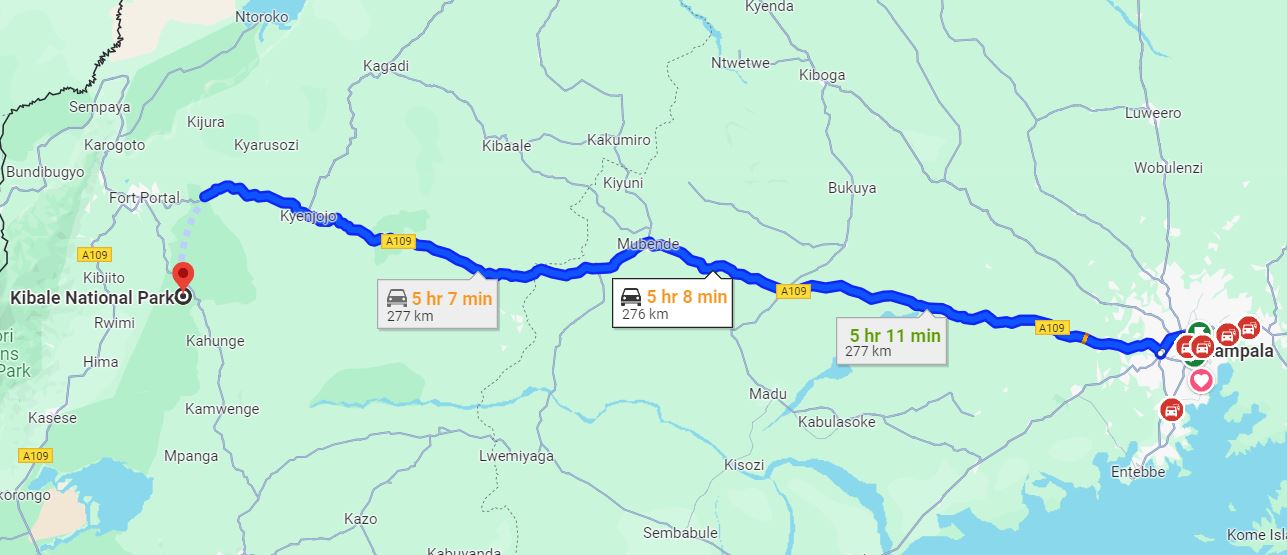Uganda parks & attractions
Kibale Forest National Park
Kibale Forest National Park is located in western Uganda, five hours drive from Kampala the capital city. Kibale Forest lies in the shadow of the Rwenzori Mountains along the Albertine Rift valley, covering varied tracts of tropical rainforest which is home to wide diversity of wildlife the most notable being the chimpanzees. The park measures 795 square kilometers. Temperatures range between 14 – 27 oc and is generally cool but gets warmer as you tend to the south where the altitude is lower tending to the hot rift valley bed
adventure and sightseeing
Wildlife & Activities in Kibale Forest National Park
Primates in Kibale Forest National Park
Kibale National Park is popular for primates, harboring the highest concentration of Primates in the world and often referred to as the primate capital of the world. There are 13 different species. The most notable primates in Kibale Forest are the Chimpanzees which make up the biggest Chimps population in Uganda with over 1000 individuals. Other primates include L’Hoest monkeys, bush babies, grey-cheeked mangabeys, olive baboon, potto, blue monkeys, black-and-white Colobus, red colobus and red-tailed monkeys.
Primates and other mammals in Kibale Forest National Park number up to 60 species. Plenty of ground animals occur in the forest including Leopards, Elephant, Buffalo, golden cats, warthogs, and bush pigs. These ground mammals are however very elusive and difficult to see in the forest. You will mostly find footprints of the big animals such as buffaloes.
Kibale Forest National Park is also home to over 250 species of butterflies and several reptiles and amphibians.
Kibale Forest National Park is one of Uganda’s birding hotspots for forest birds. The park has over 375 species including six which are endemic to the Albertine Rift Valley. The most sought after bird is the Green-breasted Pitta.
Things to do in Kibale National Park
Chimpanzee trekking in Kibale National Park

Because of the large population of Chimps, Kibale Forest National Park is the prime destination for Chimpanzee trekking in Uganda. It offers the best chance of seeing the Chimps, almost guaranteed. 3 large communities of Chimps have been habituated for the Chimp trek and there are two sessions each day of tracking each group – the morning session which starts at 7.30 am and the afternoon session which sets off at 2 pm. Only one hour is allowed when with the Chimps and no more than 8 travelers can track a community of Chimps in one session.
The Chimp trek in Kibale is not rigorous like the Gorilla trek in Bwindi National Park because of the relatively easier terrain of Kibale Forest and the territories of the habituated Chimps are not far off from the starting points. Basic fitness is sufficient.
Chimpanzee habituation
The Chimpanzee trek allows spending only one hour with the Chimps, but for a longer experience then you have the Chimpanzee habituation experience (CHEX) which is a full-day activity. You set off for the Chimp habituation as early as 6 am before the Chimps de-nest, and you can see them as they wake and follow them through the forest as they go about the day’s activities till evening time when they make new nests for the night. This is also a good activity for experiencing and observing so much of what Kibale Forest has such as other primates, birds, and wildlife.
Birding in Kibale National Park
Kibale Forest is a remarkable Uganda birding destination for forest species. The forest has over 375 bird species including many forest specials! The rare Green-breasted Pitta is the most sought-after bird in Kibale Forest. Other Kibale specials include African Pitta, Abyssinian Groundthrush, Crowned Eagle, Dusky Crimsonwing, Black-capped Apalis, Collared Apalis, Purple-breasted Sunbird, Black Bee-eater, Little Greenbull, Brown-chested Alethe, Blue-breasted Kingfisher.
Nature walks
There are established trails into Kibale Forest that you can walk and expose you to the forest inhabitants and plant life. Birds and monkeys are easily spotted through the forest and by chance may encounter the Chimps.
Bigodi wetland walk
Bigodi wetland is an eco site located at the edge of Kibale forest. It is looked after by the local community who previously occupied it. When the locals were encouraged to instead conserve the wetland as an eco site, Bigodi wetland has managed to grow over the years, attracting an array of wildlife including several species of monkeys, birds, and other animals. Often Chimps cross from Kibale into the wetland. On your visit to Kibale Forest you are encouraged to visit this wetland for a guided nature walk to not only observe the abundant primates and birds but also contribute to its conservation. All revenue accrued from the wetland goes to community.
Community tour
Take a tour to the local communities near Kibale Forest and observe their way of life and learn their about their traditions and cultures. Visit the medicine man and a women’s crafts project and purchase some souvenirs to support them.
How to get to Kibale Forest National Park

Accommodation
Luxury: Kyaninga Lodge, Crater Lake Lodge, Primates Lodge
Mid-range: Primates Lodge, Chimp’s Nest Lodge
Budget: Kibale Forest Camp, Chimpanzee Forest Guest House, Rweteera Safari Park
Book a tour to Kibale National Park




